Professor Dr Franz Ruppert's latest book is part personal account and part an update of his theoretical thinking, specifically as it relates to our society.Identity-oriented Psychotraumatology Therapy (IoPT), developed by Professor Ruppert over the last 25 years, is established as a new way of thinking about trauma, and its influence on our individual lives, and now, this new book looks at its influence on society as a whole. We know through Professor Ruppert's work, that trauma, particularly traumas that happen at the very beginning of life, have a profound influence on the lives of most of us… and we are our society. All of our societal institutions, such as our political system, our legal and justice systems, our physical and mental health systems as they currently are, are made up of us and people like us, and so have an influence on our lives, that often is in fact traumatising.Professor Ruppert makes a specific focus on the dynamics of perpetration and victimisation as the cyclic forces that hold us in a continually traumatising and re-traumatising world that it is hard to step away from. However to recognise within ourselves our ability to function as a perpetrator, as a way of not connecting with our trauma, brings us to a responsibility for our place in society and our connection with others, and is beneficial for our own well-being.At the end of the book Ruppert discusses the idea of having a clear psyche, and thereby connecting with others who also work with their traumas to clear their psyches, and suggests that by this means we can create the society that we want.

